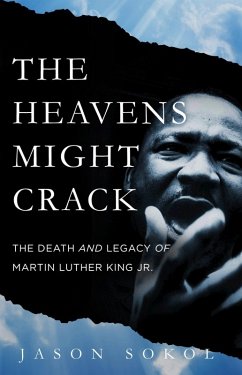
Reckoning with Race (eBook, ePUB)
America's Failure
Versandkostenfrei!
Sofort per Download lieferbar
15,95 €
inkl. MwSt.
Weitere Ausgaben:

PAYBACK Punkte
8 °P sammeln!
Reckoning with Race confronts America's most intractable problem-race. The book outlines in a provocative, novel manner American racial issues from the beginning of the nineteenth century to the present. It explodes myths about the South as America's exclusive racial scapegoat. The book moves to the Great Migration north and the urban ghettos which still plague America. Importantly, the evergreen topics of identity, assimilation, and separation come to the fore in a balanced, uncompromising, and unflinching narrative. People, cities, and regions are profiled. Despite civil rights legislation, ...
Reckoning with Race confronts America's most intractable problem-race. The book outlines in a provocative, novel manner American racial issues from the beginning of the nineteenth century to the present. It explodes myths about the South as America's exclusive racial scapegoat. The book moves to the Great Migration north and the urban ghettos which still plague America. Importantly, the evergreen topics of identity, assimilation, and separation come to the fore in a balanced, uncompromising, and unflinching narrative. People, cities, and regions are profiled. Despite civil rights legislation, the racial divide between the races remains a chasm. A plethora of reports, commissions, conferences, and other highly visible gestures, purporting to do something have generated publicity, but little else. There remain no adequate structures-family, community or church-to provide leadership. Destructive cultural traits cannot be explained solely by poverty. The book asks and answers many questions. After emancipation, how were blacks historically segregated from the rest of American society? Why is self-segregation still a feature of black society? Why do large numbers of blacks resist assimilation and the acceptance of middle class norms of behavior? Why has there been so little black penetration in the private sector? Why did the removal of overt legal segregation and civil rights legislation in the 1960s not settle the racial conundrum? What are the differences and similarities between the leaders of the civil rights movement in the 1960s and today? Why do we still have the problems enumerated in the Kerner Commission report (1968) after trillions of dollars have been spent promote black progress? What, if anything, should be done, to eliminate the racial divide?
Dieser Download kann aus rechtlichen Gründen nur mit Rechnungsadresse in A, D ausgeliefert werden.




![Black Boy [Seventy-fifth Anniversary Edition] (eBook, ePUB) Cover Black Boy [Seventy-fifth Anniversary Edition] (eBook, ePUB)](https://bilder.buecher.de/produkte/58/58416/58416760n.jpg)








